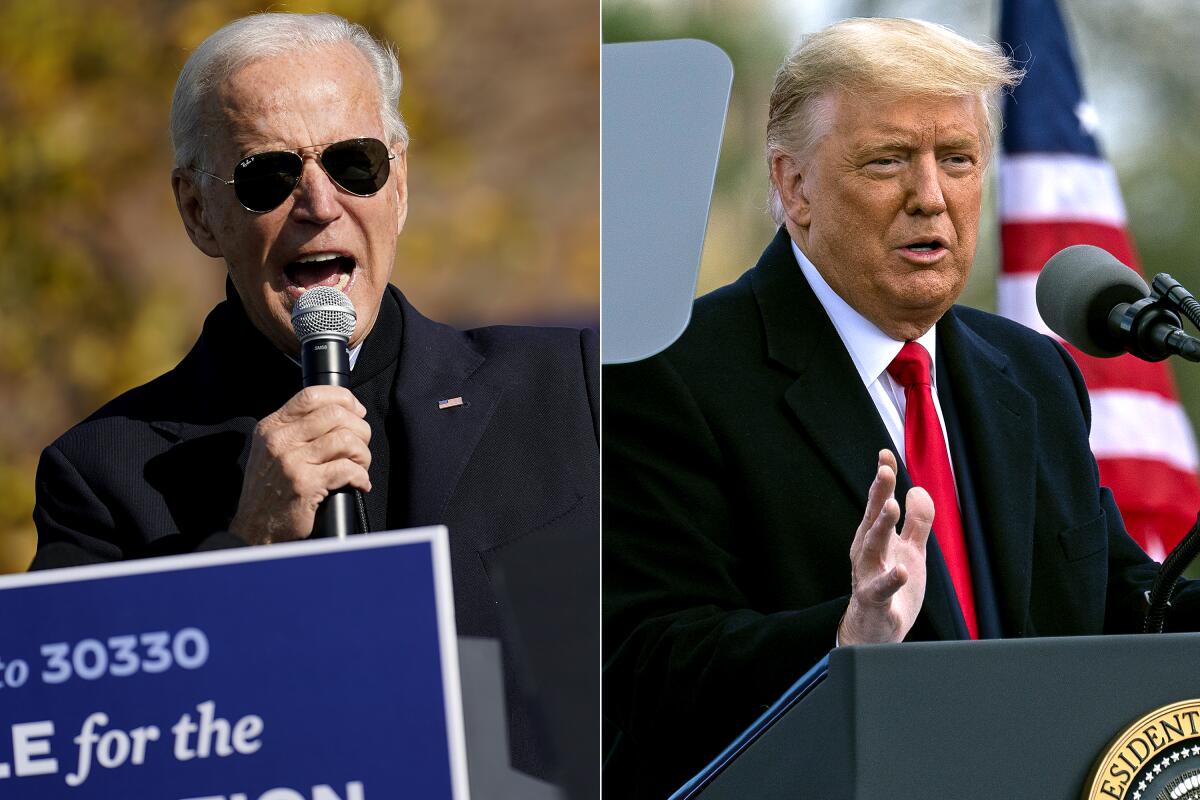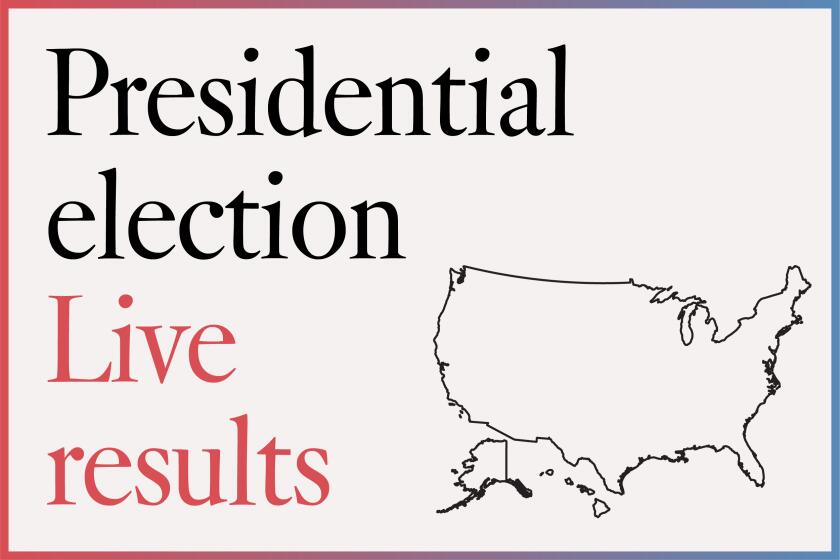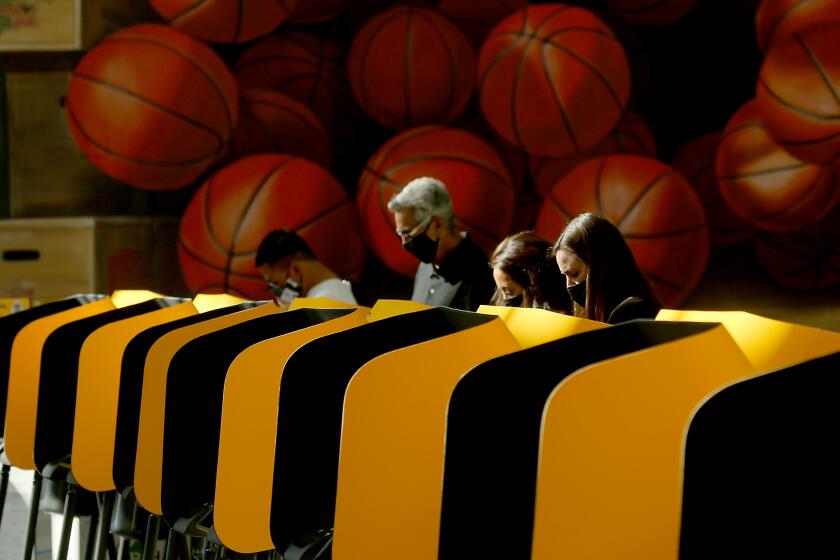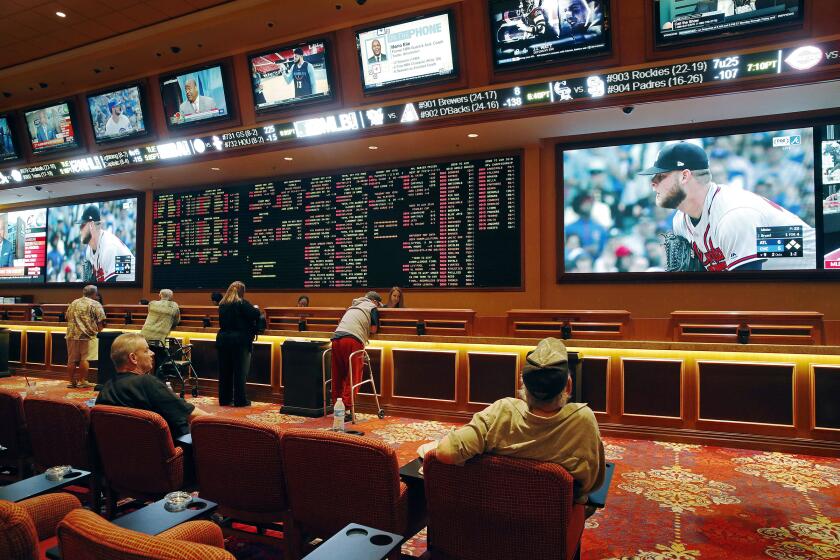Biden-Trump election has been a roller-coaster ride for bettors

- Share via
From behind his microphone in Las Vegas on Tuesday, Gill Alexander kept the discussion during Prime Time Action, his sports-betting show, focused on sports.
During commercial breaks, however, Alexander tracked the presidential race between Donald Trump and Joe Biden, and it was during one break, as polls closed on the East Coast, Trump’s vote in Florida grew and betting odds shifted in favor of the Republican incumbent with stunning speed, that Alexander asked his co-host whether what he was seeing in the betting market was real.
“There was this huge disconnect between what I like to call the pre-flop, general election betting odds versus the irrational live betting that was going on,” Alexander said. “I don’t think we’ll ever see anything quite like this again where the live-betting market was absolutely not a reflection of the truth.”
Since May, sportsbooks based offshore or in Europe, where it is legal to wager on elections, unlike in the U.S., had installed Biden as the favorite to win. The edge continued into Tuesday, where odds gave Biden an implied probability of 64% to unseat Trump, according to Pete Watt, a London-based public relations manager for Oddschecker, which compares odds from multiple sportsbooks.
Florida wasn’t essential for Biden’s path to victory, Alexander knew. He also long believed that betting markets were more accurate than polls. But as the state turned red, bettors perhaps spooked by Trump’s surprising victory in 2016 poured money in on the incumbent, which defied his expectation.
“If 2016 hadn’t happened, we would not have seen any of this behavior,” said Alexander, a host of multiple shows with the Vegas Stats and Information Network. “But because there was sort of that looming, some cloud of 2016, to others the joy of 2016, where Trump defied all the polls, I think people, as soon as Florida turned, I guess their muscle memory was ‘Uh-oh, this is 2016 all over again,’ and they went to town betting. When of course, it just wasn’t the case at all and it was way premature. It showed no patience whatsoever.”
After midnight on the East Coast, Biden’s implied probability of winning dropped as low as 22.2%, Watt said. By morning the market had stabilized, with bettors viewing Biden as three times more likely to win than Trump as returns in Arizona, Wisconsin and Michigan pointed toward the Democrat, but the roller-coaster night of activity had not been forgotten.
“Obviously this was early reporting, it’s very normal, we understand the ‘red mirage’ and the ‘blue wave,’ things happen early,” Watt said. “But the market responded very quickly. We had a lot of potentially panic bettors or panicked bettors looking to reduce their liabilities and that’s what resulted in this big sort of shift in the odds.”
A day after polls closed the race had yet to be called, but through it all at least one clear winner emerged: the betting houses that hosted the frenzied activity. By Wednesday afternoon Betfair, a European sportsbook, had pulled in more than $606 million from election wagers, according to the company. That more than doubled the total money wagered on the site during the 2016 U.S. election, which had previously held the distinction as Betfair’s most-wagered single event, according to the Action Network.
The Lakers are working on an effort to address social inequality as part of a six-step plan that goes beyond using Staples Center as a polling venue.
The current election also pulled in more money than the combined handles from this year’s Super Bowl, Kentucky Derby, NBA Finals and the 2017 bout between Conor McGregor and Floyd Mayweather, according to Watt.
PredictIt, a New Zealand-based so-called “stock market of politics” in which real-money shares of candidates can be bought and sold, also saw an unprecedented amount of shares traded Tuesday and Wednesday, said Brandi Travis, a company spokeswoman. She said the prediction market’s state-by-state electoral college calls were on track to be 100% accurate.
The 10 largest bets placed on Betfair by Tuesday morning all backed Biden as the winner, according to the Action Network, which cited data from the sportsbook. That continued the trend noticed by Watt in 2016’s presidential election, as well.
“Many more bets being placed on Trump, but the bets that were placed on [Hillary] Clinton, and this time around on Biden, those bets are much larger on average and suggesting that the more serious gamblers are seeing Biden as the realistic challenger,” Watt said. “Whereas we’re seeing more casual bettors put some of the likes of $5 or $10, in equivalent currency, on Trump.
“I think that’s because Trump is just so unbelievably engaging that he has pulled people into the betting who perhaps would only normally bet on sports.”
Legalized sports gambling in California has yet to become a reality, but companies are already preparing for a massive response from the public.
Alexander likened what he viewed as a reactionary shift in money behind Trump to someone live-betting a football game while watching small chunks of the game’s broadcast out of order, without trying to piece together the greater context. Casual fans used to betting on sports could have been tripped up by the differences in political betting, Watt said. Unlike games, which offer bettors money lines and multiple prop bets, an election provides a more binary path to winning and losing.
Still, even as Biden began to inch toward an electoral college victory Wednesday morning, bettors continued to place more bets on Trump, Watt said.
Bettors hadn’t deserted him because his increasingly longer odds offered greater value and because of his history of bucking the odds.
“How much of a firebrand he is has pulled people into the election,” Watt said, “who perhaps have never bet on elections before.”
More to Read
Go beyond the scoreboard
Get the latest on L.A.'s teams in the daily Sports Report newsletter.
You may occasionally receive promotional content from the Los Angeles Times.














